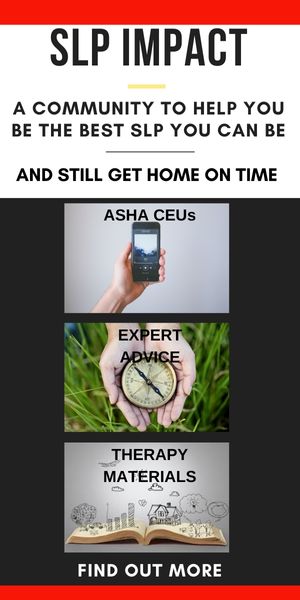Making a decision to become something is hard. I made a choice to become a speech-language pathologist almost two decades ago as a junior in high school. Though my daily SLP-shenanigans could not exist without my educational journey, I forget all of the thoughts, angst and work that went into choosing my career path. Recently, a few of our blog readers have asked important and meaningful questions related to the field of speech-language pathology. Is speech-language pathology right for me? How does it compare to occupational therapy, teaching, accounting? Are you constantly stressed as an SLP?
Let’s take some time today to tackle some of these big questions:
Are you happy in your job as a speech-language pathologist?
Speech-language pathology has a high career retention rate (11-35 years) and routinely has a job satisfaction rate of 85% while other professions work towards 60%. Other great aspects of the field are that 1) it is relatively new and is exciting to be part of an unfolding profession, 2) you can dive into a niche such as stuttering, 3) spend your entire life learning and working with great people, and 4) will never be in need of work.
ASHA, our national organization has great information on their careers page.
I did not get my undergraduate degree in speech-language pathology. Do you have any advice on how I can make myself more marketable to graduate schools and better prepare me for the SLP field?
Your application for graduate school will include various factors: GPA, GRE score, personal essays and extracurricular/volunteer experience. Your personal essays and extracurricular experience would be areas that could potentially show the admissions committee why you want to be an SLP. You can definitely find ways to gain experience in the field:
1. Shadow/interview speech-language pathologists–I recall a former principal asking me if her niece, a high school senior, could come talk to me about the field. We chatted. Years later, I interviewed her for a position in my district. If she would have asked to shadow me for a day, I would have also complied. Personally, I feel this step shows gumption for the profession.
2. Volunteer and/or work with people–The field of speech-language pathology is about interacting and helping others. Any effort and heart put towards this will complement your graduate studies as an SLP. This past year I supervised a graduate student. When she was interacting with the students in my high school life skills classroom, she demonstrated great composure, superb communication and quickly developed natural rapport. When I complimented her on her skills, she reported that she worked at a camp for young adults with intellectual disabilities as a high school student.
3. When completing your personal essays, find ways to convey WHY you want to be a part of this profession. If you speak to any speech-language pathologist, she will tell you it’s the WHY that keeps her going. In my book, this is such an honorable profession, and we are lucky to be advocates for our clients and students. Side note: Please be sure to edit, edit and edit your essays. High-quality and grammatically correct writing goes a long way.
I whole-heartedly believe that the admissions process is not based on finding people with the most experience in the field. Rather, it is about finding the best folks for the profession: those who want to help others, those who can effectively diagnose and provide evidenced-based therapy, those who can effectively work on interdisciplinary teams and those who have a passion for the field.
Here is a thought-provoking video by Simon Senek. He discussess the importance of our WHY:
Last, as a graduate student in Communicative Disorders without an undergraduate background in speech-language pathology, you will need to take leveling courses. Typically, this adds an additional year to the program.
I am considering a career in speech-language pathology, and I want to work in the schools. Do you mostly interact with special education students? If you work in a school, and assuming you have summers off, what do you then do?
As a school-based speech-language pathologist, students on the SLP caseload qualify as a student in special education. Caseload consists of students with expressive and receptive language disorders, articulations disorders, fluency disorders and social/pragmatic needs. SLPs serve students with autism, cognitive disabilities and other specialized needs. Bottom line, they are all people FIRST, and we are the lucky ones who gets to work on their functional communication skills.
From the perspective of one SLP: As a school-based SLP, I did have two months off in the summer, a spring break and two weeks off for the winter break. I have spent summer months working for the Extended School Year program for our students who require continual therapy to prevent regression, worked at a private speech and language clinic and saw my own private clients. I must admit that I have also spent the summer resting and recouping. I am an advocate of taking the time to refuel. It takes much energy and much heart to provide support for others, and it is vital to invest in myself to be a good therapist. Now, I spend my summer with my own children.
Stay tuned for another installment of Is Speech-Language Pathology Right For Me?





Thank you so much for posting this. I have always loved singing, theater, and public speaking. I love speech to say the least. Another passion of mine is also helping others. This wasn’t the first career I found when I began investigating, but as I started to look deeper, I found this one! I feel like it is a perfect blend of all of my passions and it has a high satisfaction rate which is important to me. If I am correct, it provides stability and consistent employment? I was thinking of also specializing in Spanish. Do you think it would be beneficial to branch out my possible options for speech by learning other languages?
Hi Kirsten,
We are so glad that you have found this awesome career track. There are so many different types of jobs in our field and there is always a shortage of SLPs, especially bilingual ones. So, yes, I definitely think it would be beneficial to learn another language, or two, …
i am still in the early stages of deciding if SLP is the right path for me. When i was younger I did receive therapy for articulation and volume control as i had a hearing problem, so this career resonates on a personal level and i love helping people and have always loved linguistics. Some hesitancy that i am still having is that I not what you would call an extrovert or someone who is super “bubbly,” i work better on a one-on-one basis. In your experience, are there personality types that tend to be a better fit as an SLP? Or even a more specific niche in the SLP world?
Hi, Chris. You are absolutely right–your personal experience will surely be a meaningful part of your role as a potential speech-language pathologist. You bring up a good question. Based on my time with my fellow SLPs, I see a myriad of personality traits. Each person brings his/her temperament and skill sets. We all have our “areas of expertise” and our “I need to learn more about this!” Regarding your needs to work one-on-one, I would say that your clinical experiences will give you valuable insight. At times, the outcomes of what aligns with your self-preservation needs may surprise you. Personally, I am a very introverted person–I refuel by being by myself. I enjoy spending time with few individuals, and I need my space to recoup and reflect. Coincidentally, I also love the energy and dynamic of seeing a group of students working together and relying on one another’s brains and hearts. The awesome thing about this profession is that you have a spectrum of work settings and options. Good luck in your endeavors, and if you choose to be a speech-language pathologist, you will definitely make an impact on the lives of your fellow humans.
Take care,
Phuong
Hi!
I’m also in the early stages of deciding whether SLP is right for me. My undergrad degree is in music specializing in vocal performance. I’ve done a bit of research but would love some more insight from an SLP in the field as I make this decision. I live in NYC and stability is very important. Is this a career that offers stability? Also, since my experience in communication disorders is limited, how would someone with my background stand out during the application process? This is a very costly and competitive program and I want to be sure that I’m making the right choice. I love working with people but I am also someone who likes to work behind the scenes on things. I would appreciate any advice you are willing to dish out. Any little bit would help a lot. Thanks so much!
Hi Kathy,
My favorite piece of advice that I think everyone should have is go spend a day with an SLP. We are generally really nice people and if you have a local group or school district I am sure you could find someone who would let you shadow them for a day. Maybe get them a coffee gift card to say thanks. You are right, as adults that switching careers and lots of school is costly. Make sure you shadow someone at a clinic and a school because they are very different.
Secondly, there are increasingly more programs that can be done remotely online or as part online – part in person. These are great options for getting a full income while going to school. I wish I had know about it when I began.
Lastly, speech pathology is extremely stable. We have people remaining in the field for 30+ years. There are many different routes to go – early childhood, schools, clinics, hospitals, adult rehab, nursing homes. So not only can you switch-it-up and remain an SLP your whole career, but some people work at different locations during the summer or are contracted to two different settings.
I want to follow this profession and am very interested in becoming a bilingual Slp but am a filmmaker and wonder if it is a good fit in order to be able to make movies during the summer / on the side. Is this an unreasonable schedule for a slp?
Hi Will,
Working in the schools you have your summers off just like teachers. There is an added bonus as many of us pick up hours at clinics for extra money. Plus, the field benefits from people with different passions and I am sure that film making and speech pathology would blend well. SLPs are starving for examples on how to perform good speech therapy.
Good Afternoon,
I am a first-year master’s student and I recently came across your page. I have been recently questioning my decision on whether I chose the right field to pursue since I have not enjoyed my classes or clinical experience at all this past semester, nor done well. I graduated from the University of Georgia this past May where I majored in public relations and minored in fashion merchandising, both of which I loved. I was very excited to attend graduate school however my expectations of the field are not at all living up to my reality. I am coming to the conclusion that I don’t think that I am going to enjoy being a clinician but am not wanting to give up on graduate school just yet. I came across your page because I wanted to explore other possible career options that I could do with my masters (and possibly incorporating my bachelors degree) without having to work as a clinician. I am contacting you to inquire about any advice you might have for me or any possible career option that I could do that don’t include being a clinician. I have researched online but have not found any job opportunities that don’t include being a clinician so I thought I would reach out.
Let me know your thoughts.
Best,
Mack
Hi Mack,
The time in college and graduate school is hard. There are big decisions to be made in the midst of keeping up with the academic and clinical demands. In the arena of speech-language pathology, a bulk of our speech-language pathologists are clinicians. Per the American Speech-Language-Hearing Association, here are work settings: schools (56%), health care (39%), private setting (19%). Within these settings, a majority provide direct services as clinicians. At the University setting, SLPs are researchers. Of course, in each setting, there are individuals who do not provide direct services and typically serve in a leadership capacity. In saying that, most individuals in leadership positions have previously provided services. Last, I know of indivduals who have gone through a graduate program and made a choice to serve professionally in an unrelated career. The graduate program, however, provided gifts in the form of going through the process, determing what does NOT meet your needs and, of course, a Masters degree. Good luck and take care, Phuong.
Thank you so much for your article and video! Like others here, I have a performing arts background and studied theatre. I have worked for some years now as an actor and adjunct theatre professor. Now I want a more stable income. I have looked at SLP and it looks like I would be back in school for 4 years at the very least, since I really don’t have any of the required pre-requisites on my transcript. I found a “pre-SLP” program which would give me pre-requisites but even then I would have to take a few additional courses in statistics, science, and biology (I have a couple of related class under my belt) before I could enter the Pre-SLP program.
Do you have any advice on the most efficient route (or program) to start on this track?
Thank you,
Mark
Hi Mark,
There are graduate programs with leveling courses that take three years to complete. For example, while I was completing my Masters at the University of Wisconsin, a few of my classmates with undergraduate degrees outside of speech-language pathology were completing their Masters with an added year of courses. You can find additional information on ASHA’s site. Personally, I feel that a background in theater and teaching would add so much to your journey as a speech-language pathologist. Good luck in your endeavors.
Take care,
Phuong
Hi!
I am currently an undergraduate wanting to pursue a career in physical therapy. I’ve had my eye on PT for a while now, but I’m recently hearing about SLP. SLP sounds interesting in the means of what the scope of the practice is, but I’m not too sure about SLP. I’m wondering what SLP would offer me that PT wouldn’t. Both seem like enjoyable rehabilitation careers, but I’m leaning more to the PT side. What are the aspects of SLP that people like? Are there any tips on how to make a decision like this?
Hi Anne,
Thank you for reaching out. Here are some blog posts that may give you additional information on the field of speech-language pathology.
Bilinguistics Blog Posts:
Is Speech Pathology Right for Me?
Speech Pathology Careers
I would also suggest reading articles and blog posts written by the American Speech-Language-Hearing Association, following hashtags about the field (#speechlanguagepathology, #slps2be, #slpeeps, slplife) and communicating/shadowing SLPs in your area across various settings (school-based, clinic-based, hospital-based, home-health).
Good luck in your endeavors.
Hi ,I wish to be a speech pathologist but my society isn’t helping me
I have no one to mentor me and even take up volunteery task .
ASHA has a careers page which may help you get started. https://www.asha.org/careers/